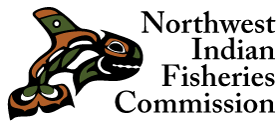Skokomish Fishermen Net Award For Hood Canal Chum Carcass Project
Categories: News
SKOKOMISH (May 17, 2005) – An effort to keep chum salmon carcasses out of Hood Canal this past fall has earned Skokomish tribal fishermen an environmental achievement award from the Hood Canal Coordinating Council.
Concern for the health of Hood Canal, which has been plagued by low oxygen problems, prompted the tribe to do its part to try and help the waterway. The tribe, along with American-Canadian Fisheries Inc., developed a project that kept chum salmon carcasses from being dumped back into Hood Canal.
Every fall, treaty fishermen harvest chum salmon returning to the State of Washington’s Hood Canal Hatchery at Hoodsport. A glut of foreign-farmed raised Atlantic salmon has flooded the market in recent years, driving down prices and market opportunities for Indian and non-Indian fishermen in western Washington. The lack of a market for chum salmon has forced tribal fishermen to turn to the roe market, where salmon eggs can fetch $5 a pound.
Stripping the eggs from the fish results in tens of thousands of carcasses requiring disposal, even after thousands of the fish have been given to tribal members and local food banks. In the past, those remaining salmon carcasses were returned to the canal – a standard enhancement practice in natural resource management.
This past fall, however, chum salmon carcasses that were not purchased were either processed by American-Canadian for food banks or disposed of at a site on the Skokomish Tribe’s reservation. Those carcasses disposed of on the reservation were mixed with wood chips and used to create compost for the tribe’s community garden and timberland.
In previous years, plants, insects, wildlife and even other fish have benefited from the nutrients that the dumped carcasses provided as they decomposed in the canal. Hood Canal, however, is now starved for the oxygen that is required to break down those carcasses. This is because most of the oxygen is used in dissolving high levels of nutrients deposited daily by thousands of septic systems lining the canal, as well as nutrients from storm-water and agricultural runoff.
“We appreciate this award that recognizes the fact that we have stepped up and done our part in trying to help keep Hood Canal healthy,” said Dave Herrera, fisheries manager for the Skokomish Tribe. “Now it’s time for the state and local governments to address the problems caused by septic systems, agricultural practices and storm-water runoff.”
(END)
For more information, contact: Dave Herrera, fisheries director for the Skokomish Tribe, (360) 877-5213, . Keith Dublanica, natural resources director for the Skokomish Tribe, (360) 877-5213, . Darren Friedel, information officer for the Northwest Indian Fisheries Commission, (360) 297-6546, .

Comments are closed.